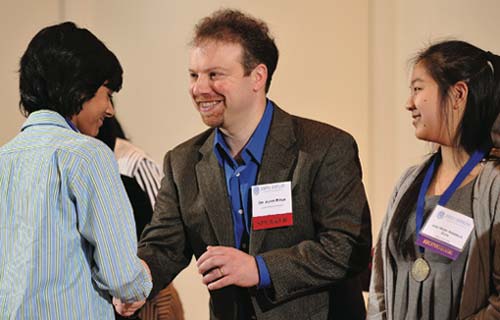CTY News of 2011
Two anniversaries, one top award, a brand new directory, and a Nobel laureate all made headlines for CTY this year.
Set
Two Milestones for CTY
CTY celebrated two important anniversaries this year. Forty years ago, in 1971, Johns Hopkins psychology professor Julian Stanley began the Study of Mathematically Precocious Youth (SMPY). At the time, Stanley thought he might find and serve a small number of bright young math students. To his astonishment, the need, which was hidden until then, was significant. What started off as a small study grew into CTY and other programs around the world based on his work.
And it’s been 20 years since young people with superb verbal talent joined their math counterparts in the new membership organization at CTY called the Study of Exceptional Talent, or SET. In 2005, through the support of generous donors, SET was endowed and named the Julian C. Stanley Study of Exceptional Talent.
In carrying on Stanley’s legacy, SMPY and SET have changed the education landscape. SMPY put a spotlight on thousands of profoundly talented young people who, before SMPY, had no real voice or advocate. Later, SET continued the champion role by offering a multitude of students—6,000 at last count—support and direction grounded in SET’s unique and deep expertise.
The two studies have informed many other activities at CTY. CTY’s award-winning Imagine magazine and Cogito website grew from SET newsletters. And CTY’s highly regarded Diagnostic and Counseling Center was influenced by SET’s counseling model.
Cogito
Online Community Wins Top Honor
CTYers know that our website and online community Cogito.org is a winner for bringing highly gifted students from all over the world together to “geek out” about math and science.
Now the rest of the world knows it, too. In October, Science magazine and its publisher, the American Association for the Advancement of Science (AAAS), awarded Cogito the Science Prize for Online Resources in Education (SPORE). Established in 2009 to encourage innovation and excellence in education, the monthly award recognizes the best Internet resources in science education. Past winners include MIT Open Courseware and Science Buddies, a site that assists K-12 students and parents with science fair ideas and projects.
Launched in 2006 with a grant from the Templeton Foundation, Cogito includes profiles of young scientists, online interviews with guest experts from all fields of science and math, blogs, and a community section for Cogito members. “We’re proud of Cogito for so many reasons, not the least of which is the opportunity to bring these very bright students together with one another and with experts who are on the cutting edge of scientific discovery,” says Patricia Wallace, CTY’s senior director of information technology and CTYOnline. “We hope Cogito helps inspire them to become the STEM innovators of tomorrow.”
As part of the SPORE award, AAAS invited the Cogito team to contribute an essay about the site. The article was published in the Oct. 28 issue of Science.
Compass
Guiding Bright Students
Finding the path to academic achievement isn’t easy. Sometimes you need help finding your way.
That’s where Compass fits in. Compass is a new, free resource for Baltimore families that brings into one volume information about more than 200 public, charter, and independent schools, as well as information about scholarship, after-school, and other educational resources for academically advanced students.
The directory was produced by CTY in partnership with Baltimore City Public Schools and the Baltimore Educational Scholarship Trust and represents a spirit of cooperation and collaboration among these parties that is unprecedented, says Thomas Wilcox, president and CEO of the Baltimore Community Foundation.
With this information together in one place, parents of bright students from all walks of life now have an opportunity to learn about what’s available for their children, adds Michael Sarbanes, executive director of the Office of Partnerships, Communications and Community Engagement for Baltimore City Public Schools.
Karen Bond, CTY’s senior director of academic services, says in the next six months she hopes to expand Compass to six cities including New York, Washington, and Boston. She also plans to hold Compass workshops to help families learn more about educational opportunities and scholarships in their areas.

Six months before winning the 2011 Nobel Prize for physics, Johns Hopkins physics professor Adam Riess gave the keynote speech at CTY’s Grand Ceremony honoring top seventh- and eighth-grade students in the 2010 Talent Search.
Riess, who participated in CTY’s Talent Search in 1983, spoke about his co-discovery of dark energy, comparing the universe to a rising loaf of bread, the galaxies to raisins in the dough, and the dark energy as a special yeast that caused the expansion to accelerate.
If teachers affect eternity, it seems keynote speakers can, too. After the talk, Riess remarked, “I remember distinctly a similar lecture I heard when I was in . . . 11th grade that pretty much set me on my course.”
